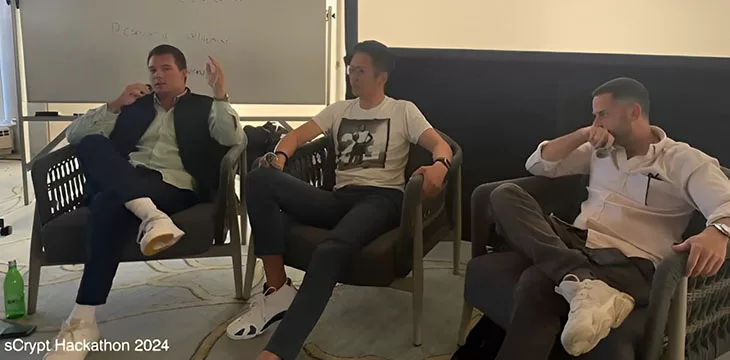|
Getting your Trinity Audio player ready...
|
A group session titled “The On-Chain Economy” at the recent sCrypt Hackathon 2024
kickoff event featured panelists Jack Liu (Ordswap, RelayX) and Josh Petty and says
Billy Rose from (Twetch, Ordinals Wallet, Yours Wallet). As you might expect from the panelists’ names, it’s a discussion that takes the enterprise-oriented blockchain approach and bolts in the opposite direction.
The full afternoon session of Day 2 is available at this link, and you can watch the entire two-day series of sCrypt Hackathon 2024 presentations on the CoinGeek YouTube channel. Most of the talks present the blockchain’s basic features, then go into more technical detail about how sCrypt’s TypeScript-based environment makes it easier for developers to turn their visions into working products.
If some of the previous talks represented the “boomers” of BSV blockchain, as described by sCrypt CEO Xiaohui Liu, this panel is the younger “degens” side hitting back. It’s highly recommended that you watch both examples in full and decide where you belong.
Is blockchain more like the entertainment industry?
“The culture in crypto is getting more and more un-serious, and that’s something I’ve believed in,” Liu says. “Because money is too serious. This idea of looking at the Federal Reserve, Janet Yellen…this whole science around economic policy, how to stimulate the economy, CPI, inflation, prices at the gas pump—this whole thing only exists because our money is not sound. Once your money is sound, you take all the energy away from all that and you start doing creative arts on top of things.”
The “big bet BSV made,” Liu adds, is that the world will get very serious around blockchains. However, a large proportion of the culture surrounding blockchain and “crypto” isn’t into that. Noting the criticism-resilience of chains like Solana and Ethereum, he says, “the wider retail community, who’ve gone through a series of getting rugged by ICOs, then on NFTs, now saying ‘well I guess I can believe in memes.”
The younger generation feels like they created this game, and it’s the one they know, Liu says. “No amount of putting on a suit is going to make all this work.
Other chains prospered because they facilitated the industry’s entertainment value, according to Petty. Probably the key word BSV blockchain can learn here is “adaptability.” All the things BSV blockchain claims to improve “are legit,” he adds, “but there’s no way to adapt to this new energy or new excitement. The adaptability of BSV—as a technology—is actually potentially the best in the world. But the money, the economics of the industry around it, is not adapting at all.”
‘We need to have more fun’
The higher-level energy surrounding blockchains like Solana is more likely to see it adopted by banks and other enterprise-tier organizations down the road, Petty says. “It’s doing the advertising for it—it starts as a joke, but it could become very serious very quickly.”
“Our competition is extremely adaptable, extremely creative, and they’re not trying to be serious.” And this is driving the significant improvements in their development.
“Everything is like, what can you do with the blockchain?” Rose says. “Yeah, you can do a lot with BSV. It’s scalable Bitcoin. You can do tons of transactions per second—seriously, nobody cares. People need to interact with it and have a good time doing it. And hopefully making money.”
The panel’s general consensus is that BSV is a great technology on which you can build almost anything, but it’s being sold the wrong way. Note: Not everyone in the audience seems to agree with the latter point. But it’s worth listening to the arguments.
Telling people you’ve made a fun app is the most un-fun thing you can do, Liu says. The most fun thing is whether it’s making a lot of money—ideally for your users, not just for yourselves. Blockchain technology is giving you tokenization mechanisms, which you can use to invite people “Do you want to join this train?” The more that do, the more money and more talent it brings.
“The question to ask yourself is: what’s only possible on BSV?” Petty remarks. He adds that it’s “not particularly wrong” to want law and order (in blockchain). But you have to balance that with the silliness. He notes that major lotteries, which are state-run entities, are more ridiculous and less capable of distributing wealth than trading tokens. And he has a point.
If you’re a developer and the presentations from sCrypt’s event sound interesting, check out the other sCrypt Hackathon sessions or look at sCrypt’s work. Even if you miss out on participating in the sCrypt Hackathon 2024, sCrypt’s website is open at any time as a resource for people to find out more.
Watch: Bitcoin removes power from money—and that’s liberating

 07-14-2025
07-14-2025 





